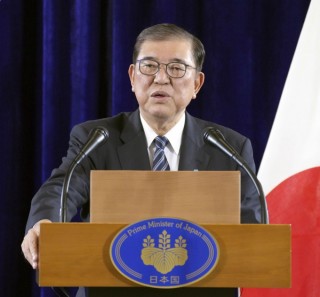Loading
Search
▼ Japan PM Ishiba Opts For Pragmatic Diplomacy, No Talk Of Asian NATO
- Category:Other
Japanese Prime Minister Shigeru Ishiba opted for a pragmatic approach in his diplomatic debut on his visit to Laos that ended Friday, avoiding any mention of his controversial proposal to create a NATO-like security alliance in Asia amid China's rise.
With national elections looming later this month and next summer, the new prime minister is expected to continue taking a cautious line in diplomacy and defense policies for the time being. However, security experts say this does not mean he has abandoned the idea of an Asian NATO entirely.
Creating an Asian military bloc was part of Ishiba's campaign pledge during the ruling party leadership race, which ultimately secured his election as Japan's next prime minister following Fumio Kishida.
In a commentary article to a U.S. think tank released just days before taking office on Oct. 1, Ishiba said, "The absence of a collective self-defense system like NATO in Asia means that wars are likely to break out because there is no obligation for mutual defense."
Comparing Taiwan, a self-ruled democratic island China views as its own territory, and Ukraine, a non-NATO member invaded by Russia, he also said, "The creation of an Asian version of NATO is essential to deter China."
He even went so far as to propose considering either "America's sharing of nuclear weapons or the introduction of nuclear weapons into the region" under the alliance framework.
The Asian NATO idea, however, has met with skepticism from countries in the region most impacted by the U.S.-China rivalry, as well as from Japan's most important ally, the United States.
Traditionally, the United States has followed a "hub-and-spoke" model in the Indo-Pacific region, focusing on strong defense ties with each of its treaty allies, such as Japan, South Korea, and the Philippines, rather than fostering connections among the allies themselves.
Before his trip to Laos for meetings with the Association of Southeast Asian Nations, Ishiba received a harsh message from The Jakarta Post, an English-language daily in Indonesia, which criticized the Asian NATO proposal as "aimed at unifying all available forces to band together against China, which would be considered very offensive for the 10-member ASEAN."
In an editorial titled "No to Asia's NATO," the newspaper said, "As a group, ASEAN needs Japan as a reliable trading and economic partner, not a military ally that would only exacerbate tensions in the region."
A Japanese government source acknowledged that setting up a NATO-style body "would end up forcing Asian states to choose" a side, which they would want to avoid.
If Ishiba sticks too much to his signature vision, it will "negatively affect" the outcome of the national elections, the source also said, given that the idea could create tensions between Tokyo and other regional countries.
Above anything else, Ishiba must first lead his Liberal Democratic Party toward a victory in the House of Representatives election on Oct. 27 to establish a lasting government. A triennial House of Councillors election is scheduled for next summer.
Masayuki Masuda, a China expert at the National Institute for Defense Studies, said pursuing diplomacy that puts the Japan-U.S. alliance at the center will "bring a sense of reassurance" both domestically and internationally ahead of the elections.
Apparently mindful of the controversy surrounding his vision, Ishiba has toned down his promotion of the Asian NATO concept since becoming prime minister.
Ishiba told a press conference as he wrapped up his two-day visit to Vientiane, the capital of Laos, that his Asian NATO proposal did not become an agenda item during the talks, saying, "It is something I have had in mind for a long time. But it is my idea, and I expect discussions will take place within the LDP to make it more concrete."
Even Foreign Minister Takeshi Iwaya has described the NATO-like security framework in Asia as a "future vision" for longer-term consideration, noting potential conflicts with Japan's pacifist Constitution, as well as the diverse political, economic, and security policies among Indo-Pacific countries.
NATO is a trans-Atlantic security alliance founded on the principle of collective defense -- meaning that an attack on any member is considered an attack on the alliance as a whole.
Security legislation that took effect in 2016 has enabled the Japanese Self-Defense Forces, only under certain conditions, to defend the United States and other allies even if Japan itself is not attacked.
The law signaled a major security policy shift for Japan, which had long maintained that it could not exercise the right to collective self-defense due to the war-renouncing Article 9 of the Constitution. The change stirred strong public protests at that time.
However, the Japanese government still retains the view that it cannot engage in collective self-defense exclusively for the purpose of defending other countries.
Whether momentum toward building an Asian NATO will grow may depend on the political strength Ishiba -- an experienced but non-mainstream figure in his party -- can establish following the elections.
"Mr. Ishiba could press ahead with his own security policies" if he determines that he can solidify his power base after achieving satisfactory results in the lower house and upper house elections, said a security expert who asked not to be named.
Tsuneo Watanabe, a senior fellow at the Sasakawa Peace Foundation in Tokyo, said he would not completely deny the potential of an Asian NATO in the future.
"Right now, nobody will be happy if it was made. But in the future, some nations could become serious about joining it from fear of China, like Ukraine currently hoping to join NATO."
"It is not to say that Mr. Ishiba has retracted the Asian NATO plan. Rather, he will keep it as a long-term goal," Watanabe said.
- October 13, 2024
- Comment (0)
- Trackback(0)


